bananas: Balking at Banana flowers: Indians are rediscovering old ways of cooking food during Covid-19 lockdown – The Economic Times 100Cleaning banana flowers takes time. You must first oil your hands to prevent staining. Then the dark red outer bracts are peeled off to reveal rows of delicate blooms.
These must be individually picked and the inedible parts, a stiff sheath and long stamen, painstakingly picked out from each one. Each flower head has many such blooms and cleaning them is an ideal job for those stuck at home thanks to Covid.
Just as people across the world are using this enforced leisure to enjoy the extended process of sourdough bread making, right from fermenting their own starter, many Indians have been using the time to rediscover old ways of cooking and eating that were being pushed aside due to lack of time.
bananas: Balking at Banana flowers: Indians are rediscovering old ways of cooking food during Covid-19 lockdown – The Economic Times 114Now there is time to clean and cook banana flower or shevla, vibrantly coloured yam shoots from the Western Ghats that need careful soaking and cooking to prevent it constricting the throat when consumed.
Now is the time to dig out old cookbooks, like the Tamil classic Samaithu Paar, with its ingredients given in old measures like ollocks and seers (Wikipedia has conversion formulae) and minutely detailed instructions on how to grind and ferment idli batter.
Now is the time to exercise arm muscles by rescuing that grinding stone from being used as a door-stop, and making chutneys with that slightly grainy texture which you never get with the pulverising power of an electric grinder.
bananas: Balking at Banana flowers: Indians are rediscovering old ways of cooking food during Covid-19 lockdown – The Economic Times 124Now is the time to unearth those heavy metal cooking utensils we had abandoned in favour of less wrist straining options made of aluminium and other lighter materials.
It all makes for satisfying effort and good pictures to post on social media, especially since evoking nostalgia is sure-fire way to get likes. But will it lead to a revival of these recipes post-Covid?
Their proponents certainly hope so, talking about the need to educate current generations, and bewailing an obsession with modernity that deems these older traditions uncool. We need to learn from our grandmothers and make masalas from scratch, stop buying only ‘English’ vegetables and using shortcuts like readymade idli batter.
bananas: Balking at Banana flowers: Indians are rediscovering old ways of cooking food during Covid-19 lockdown – The Economic Times 133No one should object to being educated about the range of ingredients at our disposal, and the many different cooking techniques used in Indian food. But it is simplistic to assume that the only reason people don’t use them is ignorance, and rather stereotyping to put our grandmothers into a box of pure tradition.
Cooking is the most practical of arts and recipes that don’t fit the routines of regular cooks, with all the demands on their time and energy when not confined by Covid, is unlikely to be used often.
bananas: Balking at Banana flowers: Indians are rediscovering old ways of cooking food during Covid-19 lockdown – The Economic Times 142What no one points out while extolling banana flowers is that when finally cooked they tend to taste rather like well-cooked red cabbage. Not exactly, of course, and people may well prefer the former – but are they the ones who also have to do the cleaning and cooking? India has a wide variety of unusual tubers, but when well cooked in a spicy dish do they really differ all that much from potatoes?
And while hand ground chutneys and pastes do taste different, perhaps even better than machine blended ones, does that really justify the knuckle scraping effort of wielding a stone grinder every time you want to have them.
The truth is that what we think of traditional Indian food depends on the generally undervalued labour of wives, daughters-in-law and servants. And when given an option most of them readily picked the less traditional, but less labourious one.
bananas: Balking at Banana flowers: Indians are rediscovering old ways of cooking food during Covid-19 lockdown – The Economic Times 151Pressure cookers, for example, cook dals into mush rather than the more textured versions you can taste when slow-cooked, for example in temple kitchens which still simmer dishes in huge vats over wood fires. It is a real and enjoyable difference, but when safe pressure cookers became available, from the 1960s onwards, most cooks happily swapped slow cooking for their speed, which shortened the time they had to spend in hot and steamy kitchens. (It is remarkable how badly ventilated many Indian kitchens still are, often without even a decent electric fan).
Old cookbooks also tend to be misunderstood. When you read beyond their yellowing pages and archaic terms, you often find views that were quite modern for their time. S.Meenakshi Ammal, who write Samaithu Paar, has become a paragon of Tamil Brahmin tradition, yet she was a woman who refused to let early widowhood hold her back, and took the unusual step of transforming her skills into a best-selling book.
bananas: Balking at Banana flowers: Indians are rediscovering old ways of cooking food during Covid-19 lockdown – The Economic Times 163And after thoroughly documenting the basics in her first book, the next two included more diverse recipes from other communities, including cakes and biscuits. This is not to claim her as a radical, but just to suggest she combined appreciation of tradition with a practical readiness to accept useful innovations – much as most of us are today.
Stainless steel, which has been much extolled on social media recently as an example of undervalued ‘real’ Indian style, offers a slight variation on this story. Its use in India is hardly traditional, dating only from the 1960s when the metal became available for kitchen use. And many traditional cooks resisted it because it is not a good cooking medium, conducting heat less efficiently than copper, brass or iron.
bananas: Balking at Banana flowers: Indians are rediscovering old ways of cooking food during Covid-19 lockdown – The Economic Times 173But as its name suggests, stainless steel excelled at being easy to clean, and that mattered to kitchen workers who were tired of handling heavy vessels that needed special scrubbing, for example with acidic solutions of tamarind. The widespread use of stainless steel really signals their quiet triumph over the weight of tradition.
None of this means that traditional recipes and ways of cooking must go extinct. They can survive in contexts where they receive their due value, like temple kitchens. The many restaurants trying to showcase traditional Indian foods are another place to preserve them, and they offer the value proposition quite clearly – do we value these dishes enough to pay the prices they charge? Or do we scoff at the idea of paying high prices for food that we consider should be made at home?
bananas: Balking at Banana flowers: Indians are rediscovering old ways of cooking food during Covid-19 lockdown – The Economic Times 183If we pick the latter, then we shouldn’t complain when those who actually do the daily cooking, alongside the demands of a non-Covid world, balk at cleaning the banana flowers.
Source:




